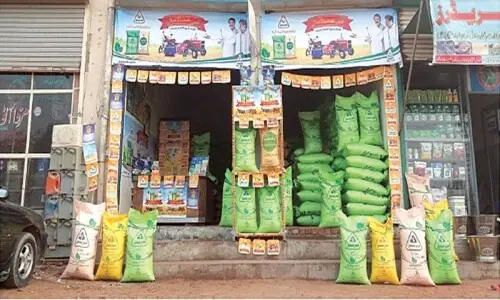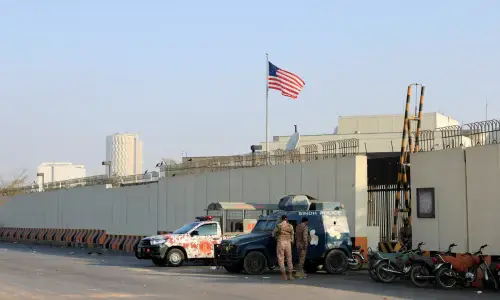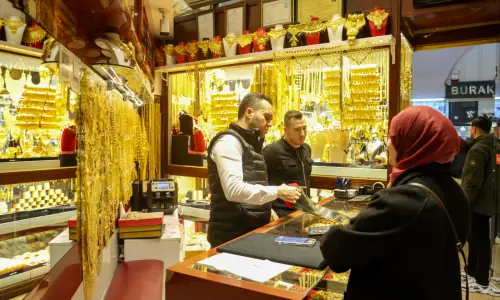DATELINE BAHAWALPUR
AS arrangements for the centenary celebrations of historic Sadiq Dane High School are underway, mystery shrouds the exact time of its establishment.
Hectic efforts were made by this correspondent to ascertain the exact year and date of its establishment. The record of Central Library, High Court Library and ‘Mohafizkhana’ has no evidence to confirm the year of its establishment. The organisers of the centenary celebrations are merely relying on hearsay and information passed from person to person from the era of defunct Bahawalpur State. Without any authenticity, the organisers declared the year of its establishment as 1906.
According to the memories and details provided by Rehmatullah Durrani, additional secretary of S D High School Old Boys Association, a high school called Sir Robert Egerton School, named after the then Lt-governor of Punjab, was opened in 1882 on a premises which was later named Zanana Hospital in the walled city. In 1886, this school was upgraded to the level of a college. It was jointly named after Nawab Sadiq and Lt-Governor Egerton (SE College) in 1895. The present building of the Sadiq Dane High School was constructed around 1906 for the S E College which continued to function in it for several years. The evidence of the construction of this building in 1906 could only be proved through the building of a boarding house near it. This building was named as ‘Sadiq Darul Aqama’ and the year inscribed on its front, still clearly visible, is 1907.
As the school continued to run on the premises of the Zanana Hospital, the formal foundation stone of the new building for Sadiq Dane High School was laid on Feb 13, 1911, by Sir Louis William Dane, Lt-Governor of Punjab. This foundation stone is still affixed and could be clearly read on the main old block facing the busy Circular Road of the present technical high school building. The S D High School was jointly named after the then Nawab Sadiq Abbasi V and Governor Dane. It continued to function in its former building till its shifting to the present S D High School building, which was handed over to it after the S E College was shifted from it to its new building. The college’s new building foundation stone was laid by the late Col A J Dring, Wazir-i-Azam (chief executive) of Bahawalpur State on June 7, 1950.
After the shifting of the college to the new building around 1954-55, the technical school was opened in the former S D School building. The S D School had been showing good results in the past years. It has produced high caliber people like judges, educationists, politicians and army officers, who are now serving the country in their respective fields. Its role during the defunct state period could be regarded as pivotal to disseminate knowledge in the defunct state areas. It is said that during that period, the school served the people from Fort Abbas to Bahawalpur and adjacent areas like Lodhran. At present, the S D School had a strength of about 2,500 students in high classes with 80 teachers. However, the primary classes have 250 students with only seven teachers. Although the 100-year-old building looks magnificent, it badly needs repairs.
The Old Boys Association has involved the district government in its centenary celebrations. The administration held a series of meetings with the association and sanctioned Rs5 million for the renovation of the building. However, there is a need of more funds for the construction of new classrooms.
According to experts, the grant is insufficient. It could hardly meet the expenditure of the renovation of the high school portion. There are no funds for the repair of the middle and primary blocks. The district government should also seek funds from the provincial government.
The century-old clock of the school is also out of order for the past many years. According to school management, the clock was repaired several years ago. It was made by the Bing Bang Company of Britain.
The district and Punjab governments should allocate more funds for the repair of middle and primary portions and construction of about 10 new classrooms for high classes. In addition, more staff should also be appointed in view of the growing number of students. This could easily be done under chief minister’s programme to meet the missing facilities in government schools.
The school management and Old Boys Association claim their right on the disputed Darul Aqama, which is presently in the possession of Government Polytechnic and Vocational Institute for Women. The row between the two educational institutions has been going on for the past many months. It reached to such an extent that the girl students had to come on roads to dislodge the students of S D School, who had occupied the boarding house building after demolishing the wall which divides both the institutions.
According to historical facts, the building of Darul Aqama may be the part of the S D School building, which was then a part of the college. But, after integration in 1955, the government commerce institute was opened in this boarding house building. The commerce institute was later upgraded to a commerce college and was shifted from this building.
Meanwhile, the women technical institutes constructed by the government in the lawns of the school and this former institute building were handed over to them. But now a row is going on over its possession.
District nazim Tariq Cheema has constituted a committee with DCO Muhammad Ashraf as its chairman and president of Old Boys’ Association, Malik Habibullah Bhutta, and other officials as its members. The committee has yet to resolve the issue on the basis of the claims and evidence from both the institutions.
Mr Habibullah, who made efforts for the allocation of funds for repair, has vowed to convert the school into a premier technical institution of the country.
Can Iraq survive a third war?
KIRKUK: The governor's office in this tense city had rarely been so crowded. Friends, colleagues and officials were queuing to congratulate Abdul Rahman Mustafa on surviving the second assassination attempt on him within a fortnight.
A suicide bomber blew himself up on Tuesday when the governor's motorcade slowed for roadworks. The armour-plated car was badly damaged, but the only fatality besides the bomber was an Iraqi civilian. Still shaken two hours later, Mr Mustafa told me he was undeterred and would carry on.
Like every other Iraqi city, Kirkuk has seen a rising tide of violence. Two years ago you could drive there from Baghdad. This time I reached it by coming south from the relative safety of Kurdistan in an armoured pick-up with five Kurdish peshmerga soldiers in the back.
The main hazard is the roadside bomb -- 663 have gone off already this year, with another 334 detected before they did any harm. They are almost always targeted at officials, police or US and Iraqi army convoys. Kirkuk has so far been spared the carnage of Baghdad and Basra, where car bombs and mortars are launched at crowds of civilians.
Indeed Kirkuk is the story of a war that hasn't happened. With a mixed population of Arabs, Kurds and Turkomans vying to control a province rich in oil, it was the place which most analysts focused on in the first weeks after the US toppled Saddam Hussein. It seems long ago now, but the argument then was that if violence were to break out in the "new Iraq", it would pit Arabs against Kurds, not Sunni against Shia, and the cockpit would be Kirkuk.
Whether Iraq is in the midst of a civil war or an insurgency has become a crucial question in the US, with obvious policy implications. For Iraqis it is academic. They see both wars happening together, with the chaos further compounded by criminal gangs who kidnap and murder for cash.
In Kirkuk, by contrast, there is only an insurgency. Ethnic war has not broken out. The picture is not so good in the other Iraqi territories with large Kurdish populations, many of which the Kurds call historically theirs. Tens of thousands of Kurds are being intimidated to leave Mosul in slow-motion ethnic cleansing. In Khanaqin, in eastern Iraq, thousands of Arab settlers who had been brought in by Saddam Hussein were summarily evicted in 2003.
But by and large the Kurds are playing fair. In Kurdistan they have enjoyed autonomy since 1991, and they pride themselves on building the kind of democracy the US hoped to install throughout Iraq after 2003. The rolling hills of their fertile region are as different from the flat lands and date-palm groves of Mesopotamia as is the political and security climate. Foreigners and locals can walk the streets and sit in cafes with no fear of kidnap or sudden death.
The Kurds are better off than if they had full independence. This would provoke regional tension, particularly from Turkey. It would also end their current position of having considerable influence in Baghdad's government, with the hope that the "disputed territories" may become theirs by non-violent means.
The bad side, as many Kurds see it, is that they are still tied economically to Iraq. Their electricity comes from the national grid, which means rations of only two hours a day, as bad as Baghdad. They have no refinery for the oil they produce. They live off revenue from the central budget, with their rightful share always cut or delayed unfairly, officials complain.
But Kurds are waiting for the referendums, promised for next year under Article 140 of the new Iraqi constitution. They would allow people to vote to join Kurdistan.
— Dawn/Guardian News Services




























